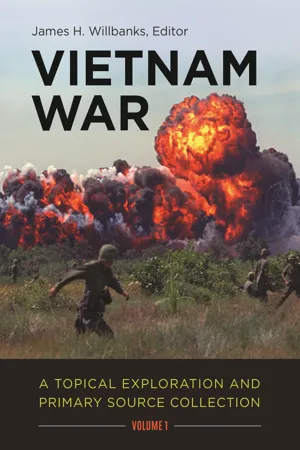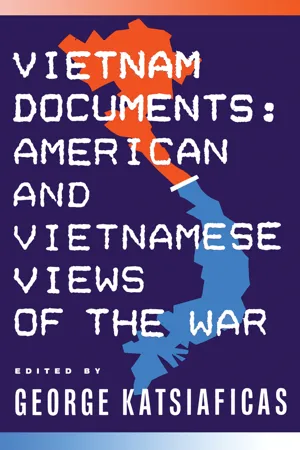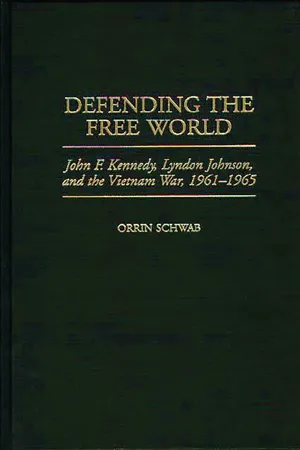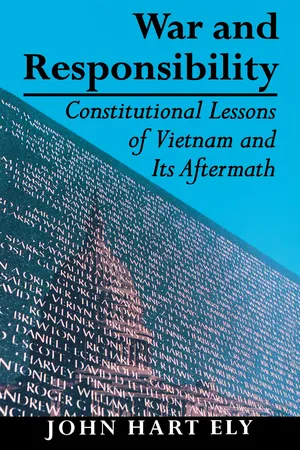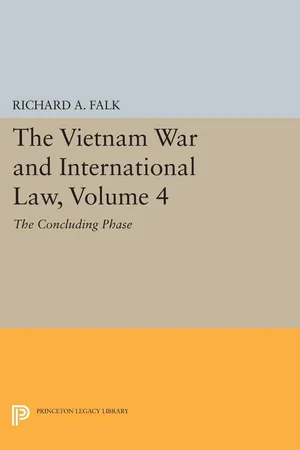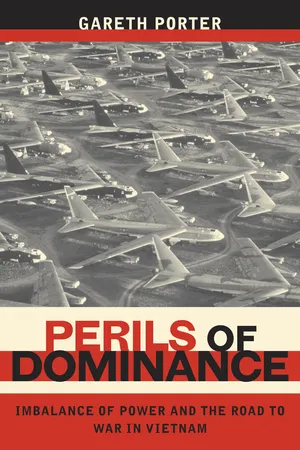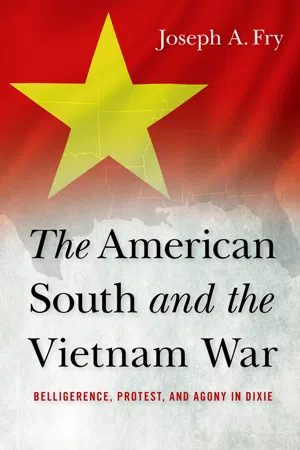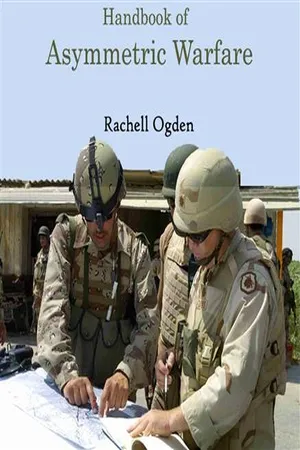History
Tonkin Gulf Resolution
The Tonkin Gulf Resolution was a joint resolution passed by the U.S. Congress in 1964, authorizing President Lyndon B. Johnson to take military action in Vietnam without a formal declaration of war. It was prompted by reported attacks on U.S. naval vessels in the Gulf of Tonkin. The resolution effectively gave the president broad powers to escalate U.S. involvement in the Vietnam War.
Written by Perlego with AI-assistance
Related key terms
1 of 5
12 Key excerpts on "Tonkin Gulf Resolution"
- Samuel Totten, Jon Pedersen(Authors)
- 2013(Publication Date)
- Information Age Publishing(Publisher)
In part, the Gulf of Tonkin Resolution reads as follows: The U.S. Congress approves and supports the determination of the President, as Commander in Chief, to take all necessary measures to repel any armed attack against the forces of the United States and to prevent further aggres- sion . . . the United States is, therefore, prepared, as the President determines, to take all necessary steps, including the use of armed force, to assist any member or protocol state of the Southeast Asia Collective Defense Treaty re- questing assistance in defense of its freedom. (ourdocuments.gov) Although Congress never officially declared war on North Vietnam, this resolution effectively gave the president free reign in conducting the Viet- nam War. Within a year of the Gulf of Tonkin Resolution being passed, more than 50,000 U.S. soldiers were deployed in Vietnam. This set a precedent that may have influenced how subsequent presidents handled armed con- flicts in places such as the Persian Gulf (1991) and Somalia (1992–1994). In 1973, in reaction to criticism of the Vietnam War and suggestions that the Gulf of Tonkin incident was exaggerated in order to gain support for the war, Congress passed the War Powers Resolution stating that the president must, within 48 hours of engaging United States armed forces, explain to leaders of Congress why the forces have been engaged and the estimated scope and duration of the involvement. All presidents since 1973 have abided by the War Powers Resolution, but it may have changed the nature of how Congress and the President view military conflict. More spe- cifically, a declaration of war can be avoided while tens of thousands of U.S. troops may be deployed. While discussions of the reasons for going to war in Vietnam should include the concepts of containment and the domino theory, the Gulf of Tonkin Resolution offers a concrete document to analyze along with the U.S.- eBook - ePub
Vietnam War
A Topical Exploration and Primary Source Collection [2 volumes]
- James H. Willbanks(Author)
- 2017(Publication Date)
- ABC-CLIO(Publisher)
Public Papers of the Presidents of the United States: Lyndon B. Johnson, 1963–64, Book 2 (Washington, D.C.: U.S. Government Printing Office, 1965), 930–932.Joint Resolution of Congress H.J. RES 1445: Tonkin Gulf Resolution, August 7, 1964 [Excerpt] IntroductionFollowing the alleged second attack on two U.S. Navy destroyers in the Gulf of Tonkin, the Lyndon B. Johnson administration submitted to Congress a resolution that in effect gave it full powers to wage war in Southeast Asia. Contrary to myths surrounding the resolution, its implications were fully discussed in the debate in Congress. The resolution was approved unanimously by the House of Representatives and by a vote of 88 to 2 in the Senate.Primary SourceResolved by the Senate and House of Representatives of the United States of America in Congress assembled, That the Congress approves and supports the determination of the President, as Commander in Chief, to take all necessary measures to repel any armed attack against the forces of the United States and to prevent further aggression.Sec. 2. The United States regards as vital to its national interest and to world peace and security in southeast Asia. Consonant with the Constitution of the United States and the Charter Of the United Nations and in accordance with its obligations under the Southeast Asia Collective Defense Treaty, the United States is, therefore, prepared, as the President determines, to take all necessary steps, including the use of armed force, to assist any member or protocol state of the Southeast Asia Collective Defense Treaty requesting assistance in defense of its freedom.Sec. 3. This resolution shall expire when the President shall determine that the peace and security of the area is reasonably assured by international conditions created by action of the United Nations or otherwise, except that it may be terminated earlier by concurrent resolution of the Congress.Source: “Text of Joint Resolution, August 7,” Department of State Bulletin 51(1313) (1964): 268.Robert S. McNamara Recommends Escalation, July 1, 1965 [Excerpts] - eBook - ePub
Vietnam Documents: American and Vietnamese Views
American and Vietnamese Views
- George Katsiaficas(Author)
- 2016(Publication Date)
- Routledge(Publisher)
Chapter III The Gulf of Tonkin IncidentDOI: 10.4324/9781315698366-3The United States never declared war on Vietnam, but the Gulf of Tonkin Resolution (Document 11) was a functional equivalent. In response to reported attacks on American ships by North Vietnam in August 1964 in the Tonkin Gulf (off the coast of North Vietnam), Congress overwhelmingly approved a resolution authorizing President Lyndon Johnson to "take all necessary measures" to prevent further attacks. With the approval of Congress in hand, President Johnson acted quickly. He personally reviewed the targets for bombing North Vietnam and made a television appearance in which he announced the attacks on U.S. ships, assuring the public that "a reply is being given as I speak to you tonight." On the next day, sixty-four sorties against four North Vietnamese targets were flown, and an estimated 25 vessels were destroyed or damaged. Two American airplanes were lost and the pilot of one of those planes, Lt. Everett Alvarez, Jr., of San Jose, California, became the first American prisoner of war. At that time, opinion polls were strongly behind the administration's actions, with 85 percent of the public supporting a military response to North Vietnam.The United States had been involved in covert actions against North Vietnam since the Geneva Convention of 1954, but these bombing raids were the first American air strikes on the North. Those directing American foreign policy had long been searching for a pretext to introduce American combat troops and air power into the conflict, and the Tonkin Gulf events provided them with the opportunity.Although rarely talked about today, there were many reasons why direct U.S. intervention in Vietnam was necessary in 1964. After the assassination of Ngo Dinh Diem in November 1963, the stability of the government and army of South Vietnam was precarious. In a period of a few months, regimes came and went in rapid succession. When he visited South Vietnam in 1964, Secretary of Defense Robert McNamara privately worried that the government of South Vietnam might crumble at any moment. Although he issued a statement of confidence intended for public consumption, he alerted the Johnson administration to the fact that without U.S. troops becoming involved in Vietnam, it could easily come to pass that the regime in Saigon would be overrun by the NLF, an event that would cause the United States not only to lose face in the eyes of a watchful world but to lose a strategic ally in the struggle against what was perceived as Soviet expansionism. - eBook - PDF
Defending the Free World
John F. Kennedy, Lyndon Johnson, and the Vietnam War, 1961-1965
- Orrin Schwab(Author)
- 1998(Publication Date)
- Praeger(Publisher)
Even with the Gulf of Tonkin resolution, this was a policy that was not to change appreciably until February 1965, when American ground troops and then the air war against North Vietnam were introduced for the first time as continuing elements of national policy in South Vietnam. 5 The period from the beginning of the Johnson presidency to the Gulf of Tonkin in early August 1964, was defined both by continuity with Kennedy's policies and by considerable planning for the emergence of a new more aggressive war policy by the United States. The Gulf of Tonkin incident and the ensuing congressional resolution gave the Johnson administration precisely what it felt it sorely needed in Southeast Asia: the domestic and international political legitimacy to expand the war against the North. The continuing crisis in South Vietnam made this expansion inevitable. Yet the administration knew that its options were limited to Kennedy's program until they developed a political justification for expanding the U.S. role in the conflict. As Toward the Gulf of Tonkin 83 one would expect, the extent of American intervention was subject to strong intergovernmental rivalry. Despite Johnson's injunction, the institutional conflicts between civilian and military leaders, and in particular between the JCS and the State Department, continued to mark the policy process, often shaping it to the dissatisfaction of rival institutional interests. NSAM 273, issued just two days after Johnson's initial talk with his advisers, confirmed the basic approach of the previous administration. The memorandum, which was written by McGeorge Bundy, summarized the general consensus on Vietnam policy reached at the Honolulu Conference of November 18-20. - eBook - ePub
War and Responsibility
Constitutional Lessons of Vietnam and Its Aftermath
- John Hart Ely(Author)
- 2020(Publication Date)
- Princeton University Press(Publisher)
SEATO Treaty could not.The Tonkin Gulf Resolution
The Southeast Asia (Tonkin Gulf) Resolution was passed by the House on August 6, 1964, the Senate on August 7, and signed by President Johnson three days later. It provided, in full:Whereas naval units of the Communist regime in Vietnam, in violation of the principles of the Charter of the United Nations and of international law, have deliberately and repeatedly attacked United States naval vessels lawfully present in international waters, and have thereby created a serious threat to international peace; andWhereas these attacks are part of a deliberate and systematic campaign of aggression that the Communist regime in North Vietnam has been waging against its neighbors and the nations joined with them in the collective defense of their freedom; andWhereas the United States is assisting the peoples of southeast Asia to protect their freedom and has no territorial, military or political ambitions in that area, but desires only that these peoples should be left in peace to work out their own destinies in their own way: Now, therefore, be itResolved by the Senate and the House of Representatives of the United States of America in Congress assembled, That the Congress approves and supports the determination of the President, as Commander in Chief, to take all necessary measures to repel any armed attack against the forces of the United States and to prevent further aggression.Sec. 2. The United States regards as vital to its national interests and to world peace the maintenance of international peace and security in southeast Asia. Consonant with the Constitution of the United States and the Charter of the United Nations and in accordance with its obligations under the Southeast Asia Collective Defense Treaty, the United States is, therefore, prepared, as the President determines, to take all necessary steps, including the use of armed force, to assist any member or protocol state of the Southeast Asia Collective Defense Treaty requesting assistance in defence of its freedom. - eBook - ePub
Presidential War Power
Third Edition, Revised
- Louis Fisher(Author)
- 2014(Publication Date)
- University Press of Kansas(Publisher)
Senate debate started on August 6 and concluded the next day, with an endorsement of the resolution by a vote of 88 to 2. During Senate debate, Gaylord Nelson (D-Wis.) reviewed the statements of his colleagues and discovered that “there is no agreement in the Senate on what the joint resolution means.” 15 Some members thought that by acting jointly with President Johnson and by announcing broad, bipartisan support, war with North Vietnam could be avoided. Others saw the need for a vigorous military response to eliminate aggression. To clarify the resolution, Nelson offered an amendment to state that President Johnson would seek “no extension of the present military conflict” and that “we should continue to attempt to avoid a direct military involvement in the southeast Asian conflict.” Senator J. William Fulbright (D-Ark.), acting as floor manager of the resolution, refused to accept the amendment because it would delay enactment. But he remarked that it stated “fairly accurately what the President has said would be our policy, and what I stated my understanding was as to our policy.” 16 Fulbright believed that the resolution “is calculated to prevent the spread of war, rather than to spread it.” 17 The House passed the measure on August 7 without a single dissenting vote, 416 to 0. The Tonkin Gulf Resolution approved and supported the determination of the President, as Commander in Chief, to take “all necessary measures to repel any armed attack against the forces of the United States and to prevent further aggression.” The statute further declared that the United States was prepared, “as the President determines, to take all necessary steps, including the use of armed force,” to assist any member or protocol state (South Vietnam, Cambodia, and Laos) of SEATO requesting assistance in defense of its freedom - eBook - PDF
The Vietnam War and International Law, Volume 4
The Concluding Phase
- Richard A. Falk(Author)
- 2015(Publication Date)
- Princeton University Press(Publisher)
(See the legisla- tive debate leading to the passage of the Tonquin Resolution and the subsequent testimony at the National Commitments Hearings—as summarized in 16 Kansas Law Review 449 at p. 472). It is contended, therefore, that at best the Gulf of Tonquin Resolution is vague as to whether it was ever intended by Congress as an exercise of its constitu- tional power under Article I, Section 8(11) and that in any event it is ambig- uous with respect to the function it was supposed to serve and the extent to which congressional authorization of war, if such ever was its intent, was being expressed. See 81 Harv.L.Rev. 1771, 1802, 1805. This seems to be recognized by the United States Senate whose National Commitment Hearings held in 1967 cul- minated in a Senate Resolution (S.Res. 187 (1967)) to the effect that "under any circumstances arising in the future" any commitment of our armed forces to hostility on foreign territory should "re- sult from a decision made in accordance with constitutional processes which, in addition to appropriate executive action, require affirmative action by Congress specifically intended to give rise to such a commitment." (emphasis added). prepared, consonant with the Constitution of the United States and the Charter of the United Nations and in accordance with its obligations under the Southeast Asia Collective Defense Treaty and as the President determines, "to take all necessary steps, including the use of armed force, to assist any member or protocol state of the Southeast Asia Col- lective Defense Treaty requesting assist- ance in defense of its freedom," and, third, that "this Resolution shall expire when the President shall determine that the peace and security of the area is rea- sonably assured by international condi- tions created by the action of the United Nations or otherwise, except that it may be terminated earlier by the Congress." - eBook - PDF
- John Dumbrell(Author)
- 2012(Publication Date)
- Red Globe Press(Publisher)
Johnson ordered retaliatory air strikes against North Vietnam. Three days after LBJ’s public announcement, and despite considerable unease in the Senate, Congress overwhelmingly passed the Gulf of Tonkin Resolution, authorizing the President to ‘take all necessary measures’ in response to aggression (Stone 2007: 35–42). Elements of the Gulf of Tonkin crisis remain murky, especially the degree to which the US might have deliberately provoked a North Vietnamese attack. However, even most revisionist historians accept that Johnson’s account of the crisis – both in his statements at the time and in his memoir, The Vantage Point – was a gross distortion of ascertainable fact. The US National Security Agency released 58 Rethinking the Vietnam War detailed intercept evidence in 2005 and 2006, revealing numerous errors and misunderstandings, but also clearly indicating that no naval engagement took place on 4 August. At the very least, LBJ was guilty, in his 4 August meeting with congressional leaders, and subsequent public announcements, of jumping the gun – acting with-out sure knowledge of what actually had occurred off the coast of North Vietnam. He later admitted, in connection with the Turner Joy : ‘For all I know, our navy was shooting at whales out there’. The text of the congressional resolution had been prepared well in advance of the August crisis, and would, in any case, have been submitted to Congress within weeks. Senator J. William Fulbright, chairman of the Senate Foreign Relations Committee, was told by LBJ and George Ball on 26 July that an authorizing resolution could actually prevent irresponsible escalation, by depriving Barry Goldwater (LBJ’s Republican opponent in the 1964 presidential election) of the ability to depict the Democrats as soft on communism (Goulden 1969: 160; Moise 1996: 203; Logevall 1999: 201; NSA 2005). The attack on the Maddox almost certainly did take place. - eBook - PDF
Perils of Dominance
Imbalance of Power and the Road to War in Vietnam
- Gareth Porter(Author)
- 2005(Publication Date)
- University of California Press(Publisher)
William Bundy, who led the drive for such a resolution, rejected an early draft of a resolution written by the State Department’s former legal adviser that had included the phrase “if the President determines the necessity thereof” in the operative paragraph on possible use of arms. The operative provision of a draft res-olution prepared during the second week in June was not a statement of congressional support at all. Instead, it formalized a military commitment to Southeast Asia that the president had strongly resisted in May. One alternative for the operative paragraph of the resolution stated that the United States “is determined to prevent by whatever means may be nec-essary, including the use of arms, the Communist regime in North Viet-Nam, with the aid and support of the Communist regime in China, from extending, by force or threat of force, its aggressive or subversive activi-ties against any non-Communist nations in Southeast Asia.” As Bundy later recalled, the argument against the resolution was that it would have committed the president to a much more ambitious policy than he was ready to embrace. 54 The leading opponent of the resolution was the president himself. Before the meeting on June 15 to discuss the resolution, McGeorge Bundy, obviously acting on Johnson’s behalf, circulated a paper that listed a series of actions to be taken on the presumption that there would be no decision to carry out the escalation against the North and no congressional resolu-tion. The participants in the meeting understood clearly that Johnson was again moving indirectly to reaffirm his opposition to widening the war. 55 TONKIN GULF: THE USURPATION OF PRESIDENTIAL POWER For decades, the Tonkin Gulf has been a symbol of deceit in the service of aggressive war. As documented in increasing detail over the years, the 192 / LBJ, McNAMARA, AND THE TONKIN GULF - eBook - ePub
- A. Short(Author)
- 2014(Publication Date)
- Routledge(Publisher)
41 His role as Senate Majority Leader during the Eisenhower presidency had however been to facilitate rather than to criticize Republican foreign policy: to the point where it was also said that his insistence on subordination to the executive on all issues of national security – even denying the right of Congress to information – seriously reduced the Senate's ability to participate in foreign policy decisions; and that by insisting that the Senate yield to the President he reduced its customary right to share in foreign policy. Having just crossed one major barrier on the road between peace and war by an open attack on North Vietnam, but with the likelihood that something more would be needed, Johnson was about to demonstrate that skill of consensus building and deployment which had been the hallmark of his political life. Of his previous Senate mobilizations it was said they were like Greek drama – most of the action had taken place off-stage – and the passage of the Tonkin Gulf Resolution through Congress was no exception. With minimum divulgence of detail that could throw into question the account of unprovoked aggression, and with Democrats and Republicans responding to the same patriotic feelings, the House voted unanimously in favour of the joint resolution.In the Senate it was to prove more difficult: even if the final score of 88-2 in favour of the resolution suggested a runaway victory. Few questions had been asked at a remarkably brief committee session but in the course of a two-day debate, apart from the poignant warnings of Senator Morse, it was obvious that many Senators had reservations about the US position and US policies in Vietnam but hardly anyone thought that was the occasion to. voice them. An unprovoked attack had been made on US ships; there had been an appropriate response; and now it was time to close ranks and support the President. Honour, integrity and vital interests were mentioned but it was a sober, responsible and dignified debate in which almost everyone agreed with Senator Fulbright that the situation had been handled in the best possible way and that the joint resolution in turn was the best way to prevent an escalation or enlargement of the war. The reassurance of Fulbright, who was steering the resolution through the Senate, with the support of Majority and Minority leaders, the more important in the case of someone like Mansfield who was known to have fundamental doubts about US policy, allowed the Senators to believe that, open-ended permission notwithstanding, they were voting to contain rather than to expand the war and the US role therein. Senator Nelson had wanted to make it absolutely explicit by introducing an amendment, part of which read: ‘Our continuing policy is to limit our role to the provision of aid, training assistance, and military advice, and it is the sense of Congress that, except when provoked to a greater response, we should continue to attempt to avoid a direct military involvement in the South-East Asian conflict.’42 On procedural grounds Fulbright regretted that he could not accept the amendment but nevertheless he gave it an endorsement which seemed just as valuable as the amendment itself: ‘I believe it is an accurate reflection of what I believe is the President's policy, judging from his own statement.’43 - eBook - ePub
The American South and the Vietnam War
Belligerence, Protest, and Agony in Dixie
- Joseph A. Fry(Author)
- 2015(Publication Date)
- The University Press of Kentucky(Publisher)
The sum was relatively insignificant, but LBJ’s characterization of the vote portrayed congressional action as a reendorsement of his Vietnam policies, as the passage of what Undersecretary of State William P. Bundy described as a “small-scale new Gulf of Tonkin Resolution.” Johnson emphasized, “This is not a routine appropriation. For each Member of Congress who supports this request is also voting to persist in our effort to halt Communist aggression in South Vietnam.” By reiterating the administration stance that “national unity” was critical to US standing “in the world,” the president suggested that antiwar dissent undermined American foreign policy; and he added the powerful warning that opposing the requested appropriation betrayed American soldiers in the field: “To deny and delay this means to deny and to delay the fullest support of the American people and the American Congress to those brave men who are risking their lives for freedom in Vietnam.” When Congress approved the appropriation overwhelmingly, Johnson had not only forced the legislative branch to go on record again backing the war but also officially introduced the potent argument that hindering funding for the war was equivalent to abandoning the troops. 11 As the Johns Hopkins speech and the May 4 supplemental appropriation demonstrated, Johnson’s acute political sensibilities and long congressional experience went far toward limiting debate and dissent, but he could not have kept Congress so well controlled during 1965 without the assistance of fellow southerners, particularly Fulbright and Russell. Had not the chairmen of the SFRC and SASC and Mike Mansfield (D-MT), the Democratic Senate majority leader, been unwilling to oppose the president or initiate a Senate debate on Johnson’s policies through most of 1965, LBJ could not have followed his relatively low-key road to war - No longer available |Learn more
- (Author)
- 2014(Publication Date)
- University Publications(Publisher)
However, there was persistent instability in the military as several coups—not all successful—occurred in a short space of time. ________________________ WORLD TECHNOLOGIES ________________________ An alleged NLF activist, captured during an attack on an American outpost near the Cambodian border, is interrogated. On 2 August 1964, the USS Maddox , on an intelligence mission along North Vietnam's coast, allegedly fired upon and damaged several torpedo boats that had been stalking it in the Gulf of Tonkin. A second attack was reported two days later on the USS Turner Joy and Maddox in the same area. The circumstances of the attack were murky. Lyndon Johnson commented to Undersecretary of State George Ball that those sailors out there may have been shooting at flying fish. ________________________ WORLD TECHNOLOGIES ________________________ The second attack led to retaliatory air strikes, prompted Congress to approve the Gulf of Tonkin Resolution, and gave the president power to conduct military operations in Southeast Asia without declaring war. In the same month, Johnson pledged that he was not ... committing American boys to fighting a war that I think ought to be fought by the boys of Asia to help protect their own land. An undated NSA publication declassified in 2005, however, revealed that there was no attack on 4 August. It had already been called into question long before this. Gulf of Tonkin incident, writes Louise Gerdes, is an oft-cited example of the way in which Johnson misled the American people to gain support for his foreign policy in Vietnam. George C. Herring argues, however, that McNamara and the Pentagon did not knowingly lie about the alleged attacks, but they were obviously in a mood to retaliate and they seem to have selected from the evidence available to them those parts that confirmed what they wanted to believe.
Index pages curate the most relevant extracts from our library of academic textbooks. They’ve been created using an in-house natural language model (NLM), each adding context and meaning to key research topics.

